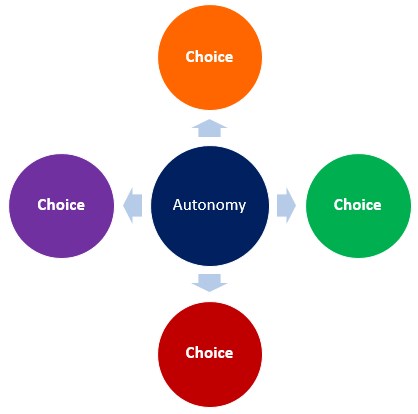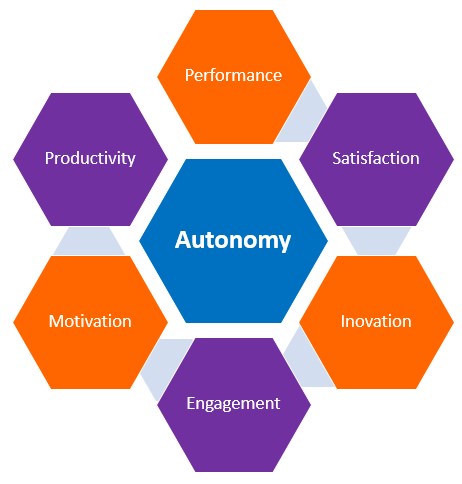Autonomy Improves our Performance
One of the keys to peak performance is the desire for individuals to direct his or her own life. As individuals, we want to be able to make choices, create new things, and control what we do. Basically, we want autonomy, and that autonomy improves our performance.
Autonomy can be simply defined as “the freedom or independence to control our own life.”
Never tell people how to do things. Tell them what to do and they will surprise you with their ingenuity. — General George S. Patton
Autonomy improves our performance in the Workplace
Autonomy in the workplace refers to the degree or level of freedom and discretion an individual is given to perform his or her assigned tasks. By giving people autonomy, you are giving them considerable discretion and control in deciding how to do their job or carry out tasks.
There are different levels of autonomy. Employees may have autonomy for their overall job or for the specific tasks they perform. Depending on the company and industry, some employees may have the ability to control their entire work situation. Those employees may have a choice of when, where, and how to do their job. Other employees with less autonomy, may be able to choose how to go about performing their job tasks.
Benefits of Autonomy
When employees have more autonomy over their individual job functions and tasks, the company can benefit.
Potential benefits include:
- Increased job satisfaction
- Increased engagement
- Greater employee commitment
- Higher motivation
- Increased performance
- Increased morale
- Improved productivity
- Innovation
- Lower turnover
A sense of autonomy has a positive effect on individual performance and attitude. Improving autonomy and independence in the workplace can transform the work experience for individuals and lead to increased performance and productivity. This is because people naturally want to have choices, to know what they are doing is of their own volition, and that they are in control of their own actions. Autonomy gives that to them. This feeling gives them job satisfaction, and satisfied employees are more likely to be productive, which contributes to overall business success.
Research
Research has shown that when employees are given the freedom associated with autonomy, it positively influences motivation and performance. Employees who feel they have the freedom to make choices in the workplace about how to do their job are happier and more productive. Also with autonomy, an employee bears more responsibility and ownership of their work, which increases engagement and can motivate them to work harder and be more invested in the outcome.
Autonomy can also help build morale and a strong corporate culture, thus decreasing turnover. Researchers at Cornell University conducted a study of 320 small businesses and found that autonomous companies grew four times faster than the traditionally managed companies. Furthermore, they found autonomous companies experienced one third less turnover.
Employees with more freedom over their work are also more likely to come up with innovative solutions that can make the company more competitive. Many extremely successful companies around the world such as Google have shown that employee motivation and performance increases when people have autonomy. Google has let people allocate 20% of their time to personal projects. This freedom to spend time doing their own thing leads to many more innovative ideas and solutions.
The Way Forward for Organizations
Historically, most organizations have had strict oversight and control at the lower levels of the organization. Management has traditionally looked to improve compliance, thus decreasing autonomy for most workers. However, if organizations want employees to be more engaged in what they are doing then allowing them autonomy will achieve that.
Research has shown work environments that are more autonomous in nature have higher job satisfaction and better productivity. Therefore, it is beneficial for organizations to consider what they can do to give employees the ability and tools that enhance and support their daily tasks while contributing to the corporate goals. Organizations may let employees set their own schedules, choose how to do their work or even elect to work from home. When people feel they have more control and discretion over their work activities the results are remarkable.
Considerations
- Autonomy is especially impactful when the work is complex or requires more creativity. Autonomy does not have as much impact on productivity in a job involving very routine tasks. However, even routine jobs that are given autonomy can increase employee satisfaction which in turn leads to other positive outcomes.
- Not all employees want autonomy. Some people want to be told exactly how they should perform the job so they can meet expectations.
- Too little direction can leave employees confused as to what they should be doing and how they should do it.
Reference
https://www.ragan.com/Main/Articles/Motivate_and_engage_your_employees_through_increas_50509.aspx


